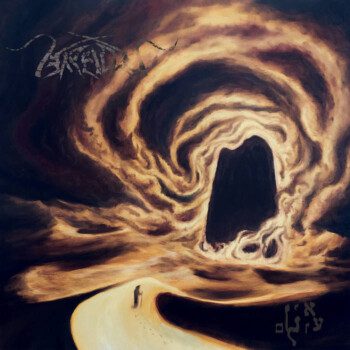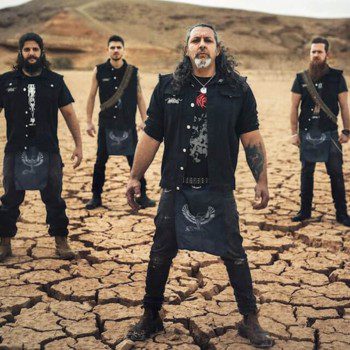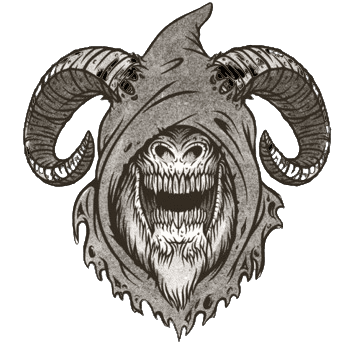Arallu is an Unholy and Extreme (Middle-Eastern) Black Metal band from Israel. The band released their seventh studio album, “En Olam,” (“There is no world” in Hebrew language), which would gratify fans of Melechesh and Mayhem. The album was released through Satanath Records and Narbentage Produktionen.
En Olam, Arallu Review: This review will evaluate every aspect of the album, from its intricate musical composition to its production. Our analysis will provide valuable insights to help you determine if this album is worth adding to your collection.
The First Three Sins, The Summary
The First Sin, The Strings/Keys: Showcasing a guitar sound that is raw, mid-scooped, and heavily buzz-saw influenced. The bass lines are gritty and distorted, weaves together, Middle Eastern instruments. The Second Sin, The Vocals: The vocals are guttural, arid, and fierce… The Third Sin—The Percussions: The drumming combines explosive blast beats, driving d-beats, and tribal rhythms…
The Fourth Sin, Overall Discussion
Before we dive into the review, let’s take a fresh look at Arallu and their album, En Olam. Originally penned in 2020, the initial review can still be found here. I thought it would be refreshing to reimagine some older reviews in a more modern style, making them more significant and detailed, like the reviews that are showcased now.
The moment the listener hits the play button, they are welcomed by The Center of the Unknown, which envelops them in an enchanting Arabian soundscape. This is complemented by a powerful blend of metal instrumentals and vocals that strike deep into the soul.
As the audience embarks on their exploration of the second track, En Olam, along with the other eight songs, they are immersed in a rich tapestry of lyrical themes. This collection navigates through the realms of war, mortality, Mesopotamian legends, critiques of religion and politics, existential dilemmas, apocalyptic imagery, and spiritual emptiness. Songs such as Achrit Ha’yamim (End of Days) and Prophet’s Path delve into these profound ideas, merging fierce metal with traditional melodies to craft a narrative that is both eerie and reflective.
Arallu‘s album En Olam is a whirlwind of sound, featuring ten tracks that span thirty-eight minutes. It offers listeners more than just extreme metal; it immerses them in the band’s rich heritage, conflicts, and mythology. The name Arallu, or Irkalla, refers to the ancient Mesopotamian underworld, governed by Ereshkigal, the queen of the dead. This realm is a dark, dusty, and silent void where all souls journey after death, devoid of the rewards or punishments found in contemporary concepts of heaven and hell. The album also weaves in traditional Middle Eastern instruments such as the Saz, Darbuka, and Baglama.
Arallu‘s music delivers an intense and aggressive experience to the listener through its meticulously crafted composition and arrangement—whether it be through the striking instrumentation or the powerful musical elements. All of which are skilfully provided by this enigmatic fruit of the dark arts. The way in which the composition is encapsulated within the modern metal production gives it a distinctive edge—a roughness that isn’t overly polished. This allows for a sonic landscape that feels gritty, weighty, and unapologetically raw with its understated layers. It’s a sophisticated fusion of various ethnic influences seamlessly intertwined, offering a balance of clarity and raw intensity that doesn’t compromise on its primal essence.
En Olam features a dynamic instrumental composition and intricate scoring, showcasing a guitar sound that is raw, mid-scooped, and heavily buzz-saw influenced. It evokes the classic vibes of Mayhem or Darkthrone, yet incorporates groovy, riff-driven segments reminiscent of early Sepultura and the Eastern Folk Metal influences of Melechesh. The guitar work includes tremolo-picked black metal sequences and thrash-inspired chugs, interspersed with occasional Eastern scales and melodic embellishments. The bass lines are gritty and distorted, delivering a filthy low end that doesn’t merely shadow the guitar; instead, it introduces rhythmic tension, crafting a tribal essence.
The drumming combines explosive blast beats, driving d-beats, and tribal rhythms alongside Middle Eastern percussion. The patterns shift between classic black metal intensity and folk-inspired time signatures. The vocals feature harsh black/death growls and piercing shrieks, with Butchered delivery being predominantly guttural, arid, and fierce, often enhanced with layers or echoes to enrich the ambiance. In addition to the metal instrumentation, En Olam incorporates tracks with samples of Hebrew and Arabic speech or chanting, utilizing effects like reverb and delay to evoke a ceremonial or apocalyptic feel.
At times, the work incorporates field recordings, spoken word, and ritualistic chants, all blended in a lo-fi style to create a tense and ethereal atmosphere while also connecting themes beyond mere pacing. The Middle Eastern instrumentals are not mere gimmicks; they are integral to the songwriting, typically serving as the emotional backbone of each song. The instrumentation features the Darbuka, a hand drum that produces hypnotic and powerful rhythms, alongside the Saz/Baglama, a string instrument that evokes haunting, ancient melodies.
The Oud, a lute with a short neck, serves as a bridge for interludes and introductions, while the Ney, akin to a flute, creates an atmospheric backdrop. Arallu intricately incorporates the Saz, oud, Darbuka, and various traditional instruments throughout their music, not merely as introductions. These instruments are usually recorded with a dry mic setup, avoiding excessive reverb, and occasionally captured live, preserving their raw imperfections—infusing the sound with a sense of humanity and antiquity. Achieving the right balance is crucial: the ethnic elements remain prominent without overshadowing the metal.
Overall, Arallu and their album, are more than music; it’s a statement—music that is deliberately raw, “making you feel the dust of war.” “Culturally honest,” “Middle Eastern instruments are mixed with respect, not as exotic flair and thematic” and “every production choice supports their atmosphere of myth, violence, and apocalypse.”
The album culminates with the last track, Spells, as the sandstorm calms, yet the echoes of war and conflict resonate far beyond the horizon. We want to give a shoutout to Arallu for letting us review their En Olam album, back in 2020. Now, we’re going to wrap it up by talking about the final three sins and concluding the review.
The Fifth Sin, The Memorabilia
For me, En Olam is more than just a sturdy or full of life demonic beast; it embodies a vortex of immense monstrous energy that intricately weaves together the evocative scents and sounds of the Middle East. This fusion is not merely about giving life to a song, but also about transcending into something beyond the tangible, encapsulating a mesmerizing essence. It transports listeners to a world where primal forces and cultural echoes converge in a spellbinding narrative.

The Sixth Sin, The Artwork
Fits the album and the band’s music well. It looks like the gates to the underworld in Mesopotamian mythology (In Mesopotamian mythology, “Arallu” is the underworld kingdom ruled by the goddess Ereshkigal and the god Nergal, where the dead are judged)
The Seventh Sin, Disrelish
There is nothing to dislike in the musical offerings of Arallu and their album, En Olam. Thus, we conclude our review of Arallu and their album, En Olam. I would like to take this opportunity to express my gratitude for your time in reading this article, but also I hope you enjoy the re-phrase version of this review, as I did enjoy returning and re-writing the review. I encourage you to explore the work of Arallu.
Track-Listing
01. The Center of the Unknown
02. En Olam
03. Devil’s Child
04. Guard of She’ol
05. Vortex of Emotions
06. Achrit Ha’yamim
07. Prophet’s Path
08. Unholy Stone
09. Trial by Enslaved People
10. Spells
Members
Butchered — Vocals, Guitars, Bass
Eylon B — Strings, B. Vocals
Ofek Omius Noy — Guitar
Richard — Drums & Percussion

